Joe Biden has lifted restrictions blocking Ukraine from striking deep inside Russia with long-range US missiles, according to multiple reports.
Ukraine plans to conduct its first long-range attacks in the coming days, three sources familiar with the matter told Reuters, without disclosing further information over operational security concerns.
The move, just over two months before Donald Trump takes office, comes after months of requests by Ukrainian President Volodymyr Zelensky to use Western long-range missiles inside Russia.
Responding to the reports, Zelensky said “such things are not announced” and “missiles speak for themselves”.
Russian politician Maria Butina said Biden was risking World War Three if it had allowed Ukraine to use US-made weapons to strike deep into Russia.
“These guys, Biden’s administration, is trying to escalate the situation to the maximum while they still have power and are still in office,” Butina told the Reuters news agency on Monday.
“I have a great hope that [Donald] Trump will overcome this decision if this has been made because they are seriously risking the start of World War Three which is not in anybody’s interest.”
The White House declined to comment, but US media including the New York Times, Washington Post and Associated Press all carried briefings from anonymised US officials on the decision.
Biden did not mention the decision during a speech at a stop in the Amazon rainforest in Brazil on his way to the G20 summit.
The longer-range missiles are likely to be used in response to North Korea’s decision to support Putin’s invasion of Ukraine, according to one of the people familiar with the development.
The first deep strikes are likely to be carried out using American ATACMS rockets, which have a range of up to 190 miles, the sources said, raising questions over the possible use of British Storm Shadow cruise missiles inside Russia.
While the US and UK have so far blocked the Ukrainian military from using the UK-made missiles, senior British military officials have urged the Government to allow Ukraine to use the weapons “without restrictions”.
“We should not be intimidated or bullied by Putin’s threats,” Lord Dannatt, former head of the British Army, told i.
“We should allow Ukraine to use UK Storm Shadow against legitimate Russian military targets within Russia, such as airbases, logistic depots and command centres.
“We need to help them to dominate Russia on the battlefield. This is in the best interests of Kyiv and all in Western Europe.”
Vladimir Putin has warned that allowing Ukraine to use long-range Western missiles inside Russian territory “would mean that Nato countries, the United States, and European countries are at war with Russia”.
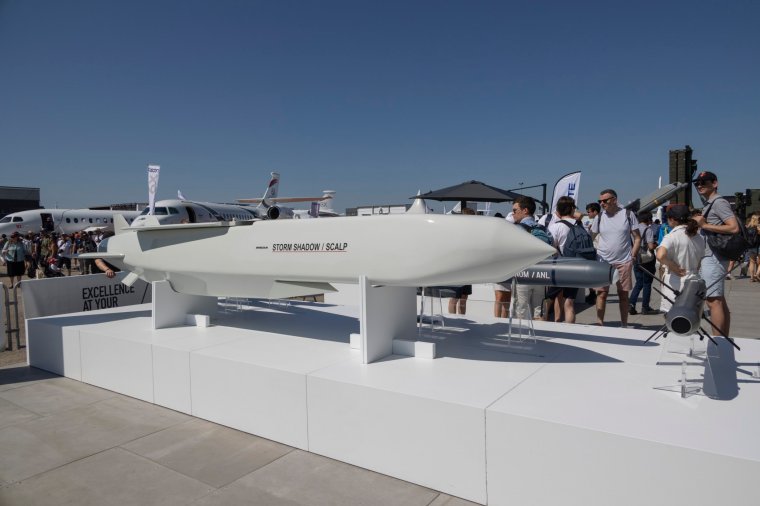
Sir Keir Starmer said that Ukraine was at the “top” of his agenda as he travelled to the G20 summit of world leaders on Sunday.
“We are coming up to the 1,000th day of this conflict on Tuesday,” the Prime Minister told reporters on the way to the summit in Brazil.
“That’s 1,000 days of Russian aggression, 1,000 days of huge impact and sacrifice in relation to the Ukrainian people and recently we’ve seen the addition of North Korean troops working with Russians which does have serious implications.
“I think on one hand it shows the desperation of Russia, but it’s got serious implications for European security … and for Indo-Pacific security and that’s why I think we need to double down on shoring up our support for Ukraine and that’s top of my agenda for the G20.”
Separately, a Russian strike on a nine-story building in the city of Sumy in northern Ukraine killed eight people and wounded dozens, an official said Sunday, as Russia launched a massive drone and missile attack described by officials as the largest in recent months.
Among the eight killed in Sumy, 40 km from the border with Russia, were two children, said Ukraine’s Minister of Internal Affairs Ihor Klymenko.
A “massive” Russian missile and drone attack targeted power infrastructure across Ukraine overnight, including near the border of Poland.
“Another massive attack on the power system is taking place,” Ukraine’s energy minister German Galushchenko said. Officials believe it to be the largest attack on the region since early September.
Moscow confirmed it attacked Ukrainian energy resources in its attack, the defence ministry said, according to Russian news agencies.
Russia launched around 120 missiles and 90 drones during a “massive combined strike on all regions of Ukraine”, Zelensky said.
In a statement he said it shows Moscow is trying to “intimidate” Ukraine with “cold and lack of light” as its targets crucial energy systems. “The whole world sees and knows that we are defending ourselves against absolute evil, which does not understand any language but force. We need unity, the world needs unity. Only together can we stop this evil.”
The Ukrainian president said Moscow was targeting the country’s energy infrastructure and had left some areas without power.
The missiles – cruise, ballistic and aeroballistic – included “zirkons, Iskanders, and daggers”, Zelensky said in a post on Telegram.
Drones included Iranian-designed Shaheds. Ukrainian air defences destroyed more than “140 air targets”, he said.
At least seven people died as a result of Russia’s overnight attack, Ukrainian officials said.
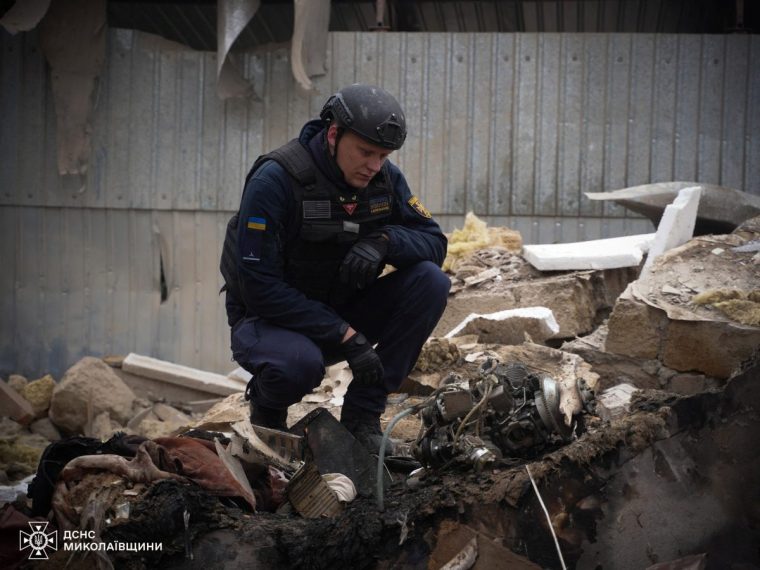
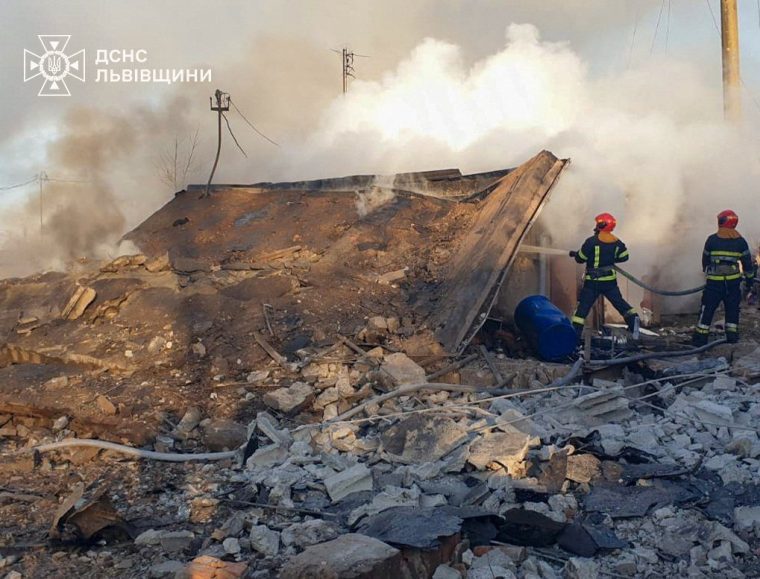
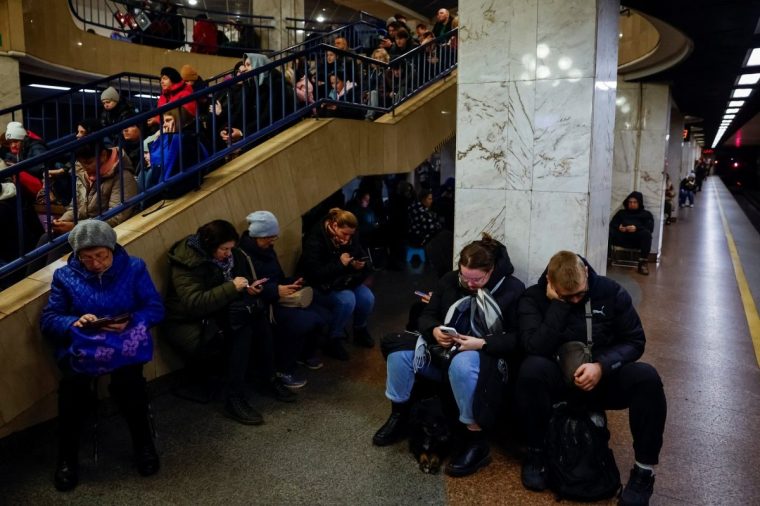
In the south, the city of Mykolaiv was among the worst hit, with at least two people killed and several injured, including children.
Further south, two people have died and a 17-year-old was injured in the Black Sea port of Odesa. Oleh Kiper, the local governor, said the region’s energy infrastructure had been damaged, causing “interruptions in the supply of heat, water and electricity”.
A 66-year-old woman also died in the Lviv region in western Ukraine, the area’s regional head has said. In the central Dnipro region, two people died and three were wounded in a strike on a rail depot.
“The enemy’s target was our energy infrastructure throughout Ukraine. Unfortunately, there is damage to objects from hits and falling debris,” Zelensky said.
“In Mykolaiv, as a result of a drone attack, two people were killed and six others were injured, including two children. My condolences to the relatives and friends of the deceased. As of now, areas are without power, [and] all the necessary forces are involved in the elimination of consequences and in restoration.”
Ukraine’s state emergency service said the drone attack in the early hours of Sunday morning hit a multi-storey building, cars and a shopping centre in Mykolaiv.
Blasts were also heard in the southern Ukrainian city of Zaporizhzhia and the Black Sea port of Odesa, Reuters reported, citing witnesses. Emergency blackouts were announced in regions under Russian attack, the BBC reported.

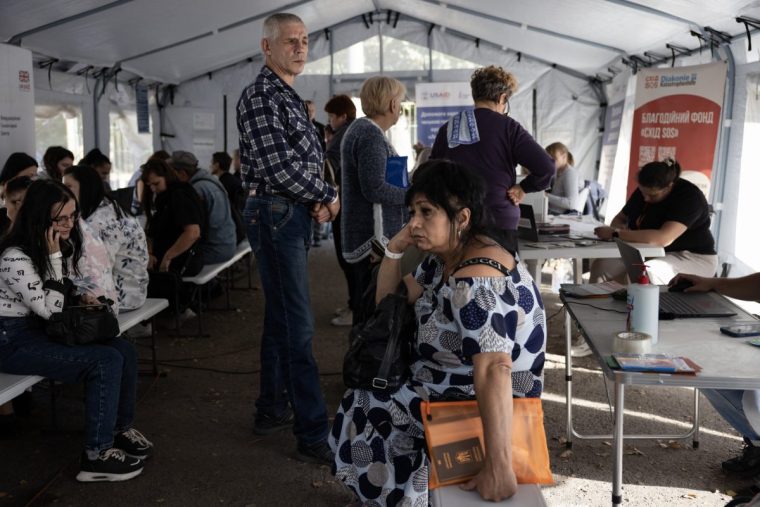
More blasts were reported in the regions of Kryvyi Rih in the south and Rivne in the west of Ukraine, with Poland confirming that operations by Polish and allied aircraft were underway as a precaution.
In the capital, Kyiv, fragments from intercepted missiles and drones fell in several places, but there were no reports of injuries. People were forced to take refuge in metro stations in Kyiv overnight.
All Ukrainian regions will experience temporary restrictions on power consumption on Monday following the air strike, the national grid operator said on Sunday.
In a statement, Ukrenergo said temporary cut-offs would last from 6am until 10pm local time, adding that workers were repairing damages as quickly as possible.
Moscow’s rockets have reached the region of Ukraine that is farthest from Russia, a Ukrainian MP said.
Ukraine’s minister for foreign affairs, Andrii Sybiha, said “peaceful cities, sleeping civilians” and “critical infrastructure” were targeted.
Sybiha described the apparent bombardment as Putin’s response to those who had “called and visited him recently”, in an apparent reference to a phone call between German Chancellor Olaf Scholz and the Russian president.
“We need peace through strength, not appeasement,” Sybiha said.
Zelensky earlier criticised the call between Scholz and Putin, saying it had opened a “Pandora’s box”.
Poland “activated all available forces and resources at his disposal, the on-duty fighter pairs were scrambled, and the ground-based air defence and radar reconnaissance systems reached the highest state of readiness,” the operational command of its armed forces posted on X.
It called the bombardment a “massive attack” by Russia, which it said was “carrying out strikes using cruise missiles, ballistic missiles and drones against sites located, among other places, in western Ukraine”.
Ukrainian MP Oleksiy Goncharenko said on X that missiles also made it to Zakarpattia Oblast, which is “very close to Hungary”.
That is a rare event because there are “mountains and it is the most remote region of Ukraine from Russia”, Mr Goncharenko said.
Ukraine being given the green light to use long-range missiles against targets inside Russia could have “prevented or drastically reduced” Moscow’s massive attack on Ukraine, according to a global affairs analyst.
Michael Bociurkiw, a senior fellow at the Atlantic Council, said Joe Biden may now use a “window of opportunity” before he leaves office to “give Ukraine a bit more of an upper leg” against Russia.
“What happened today probably could have been either prevented or drastically reduced had President Biden given the okay for those Anglo-French Storm Shadow missiles to be used to strike at the bases where these projectiles come from,” he told Sky News.
Polish Prime Minister Donald Tusk says “telephone diplomacy cannot replace real support” for Ukraine – in what appears to be a reference to the much-criticised phone call between the leaders of Germany and Russia on Friday.
“No-one will stop Putin with phone calls. The attack last night, one of the biggest in this war, has proved that telephone diplomacy cannot replace real support from the whole West for Ukraine,” he wrote on X.
“The next weeks will be decisive, not only for the war itself, but also for our future.”
UK foreign secretary David Lammy has condemned Russia’s “deplorable” strikes on Ukraine’s energy grid.
Posting to X, he said they show “Putin’s desire to weaken the resolve of a country he thought would be beaten in days. It won’t work. We stand with Ukraine”.

